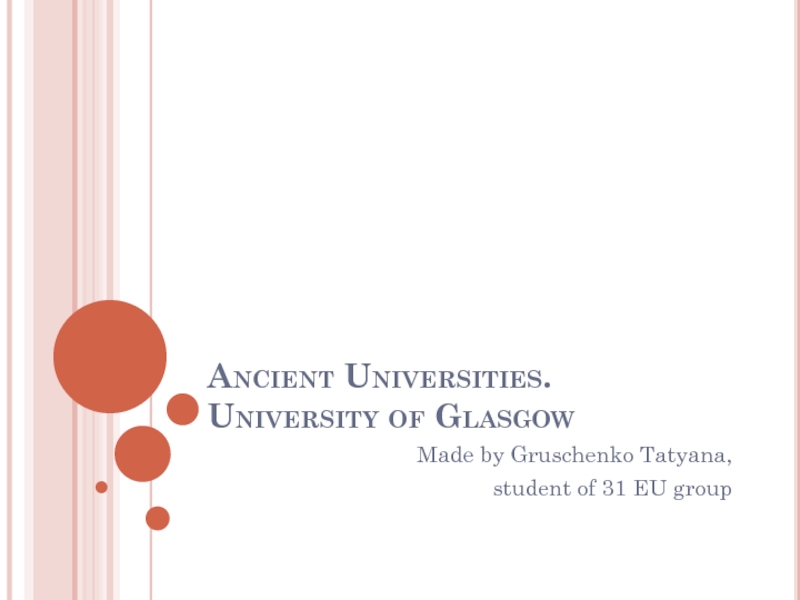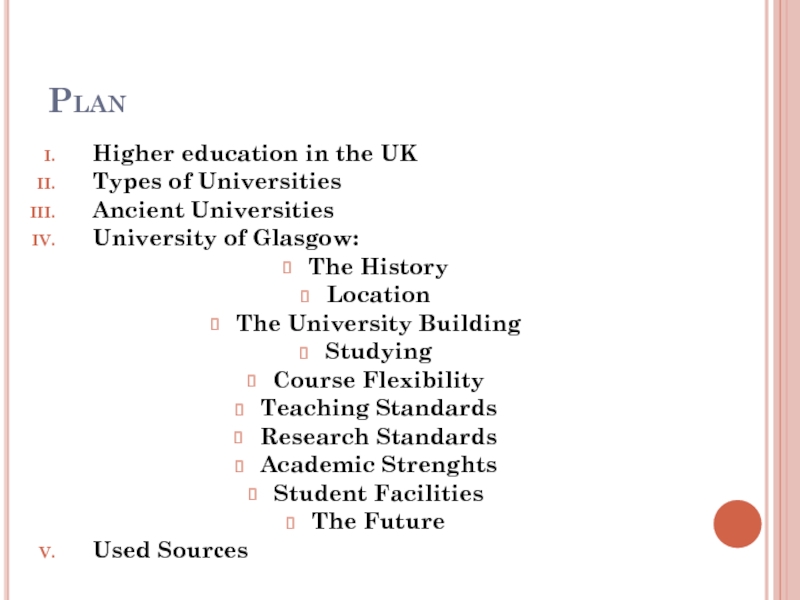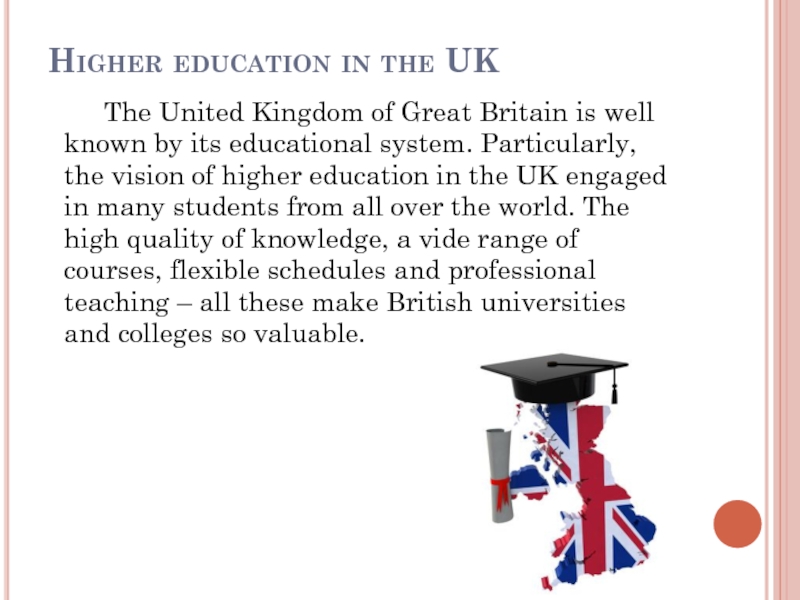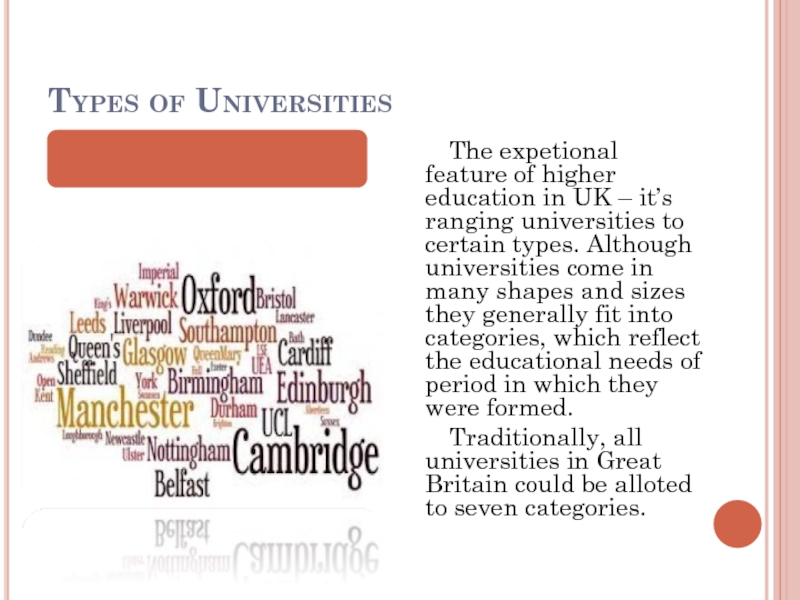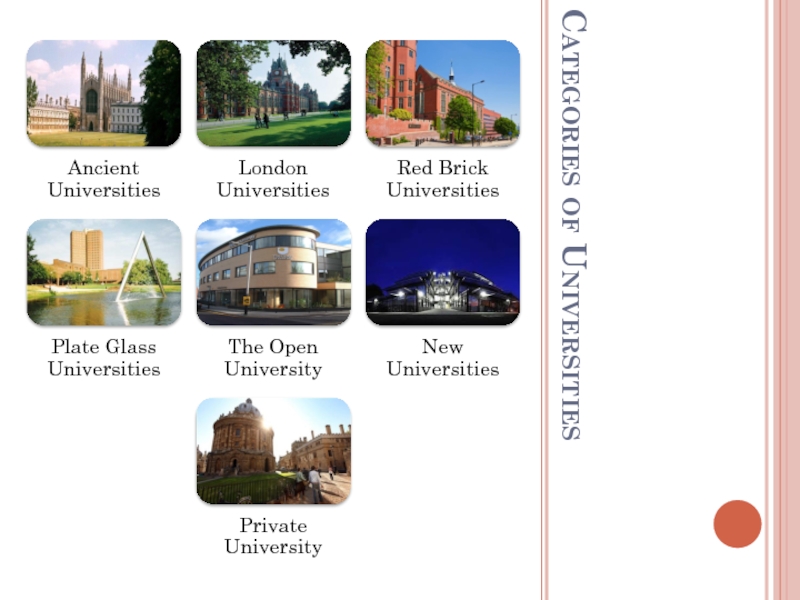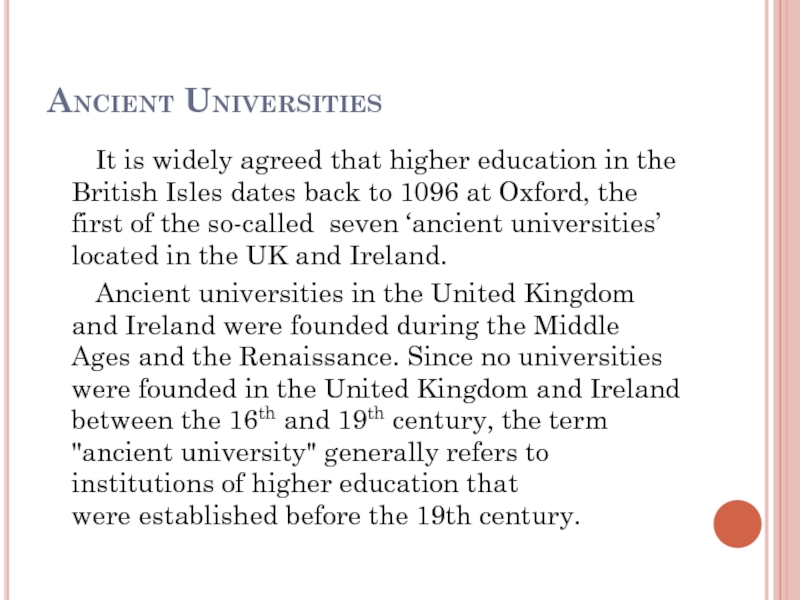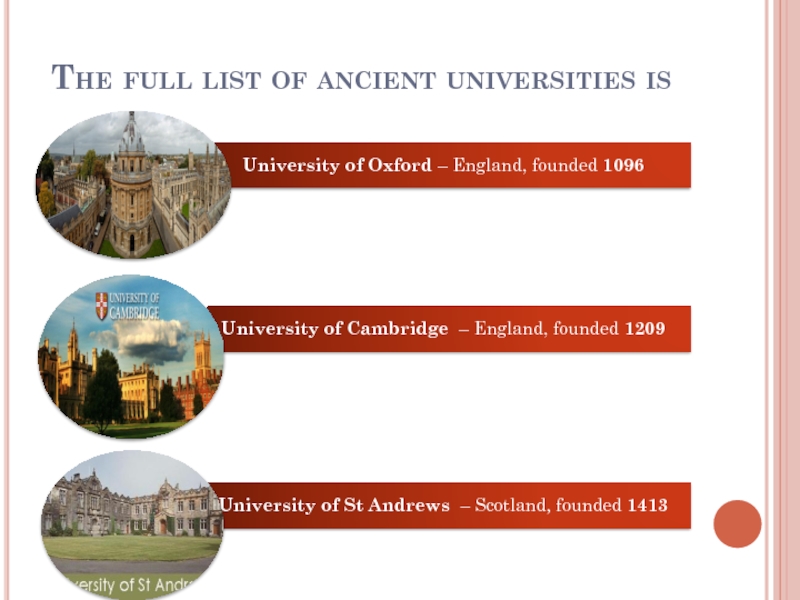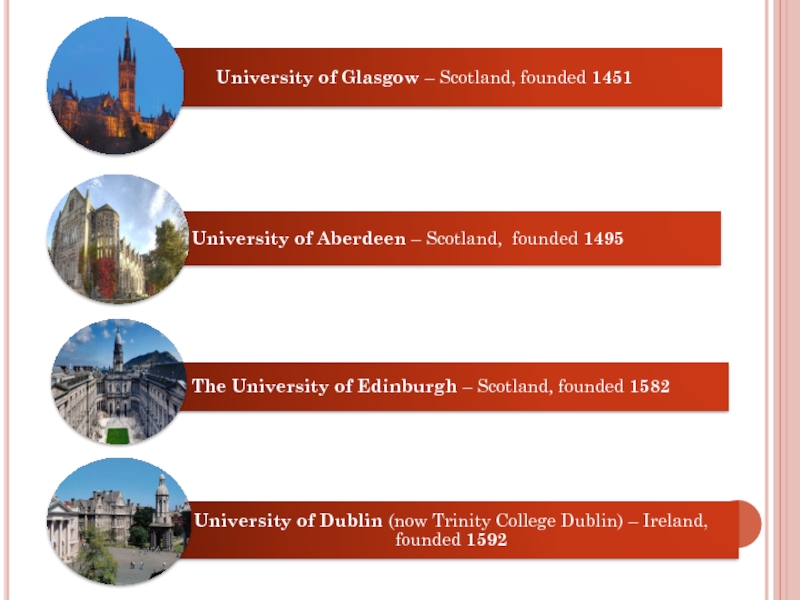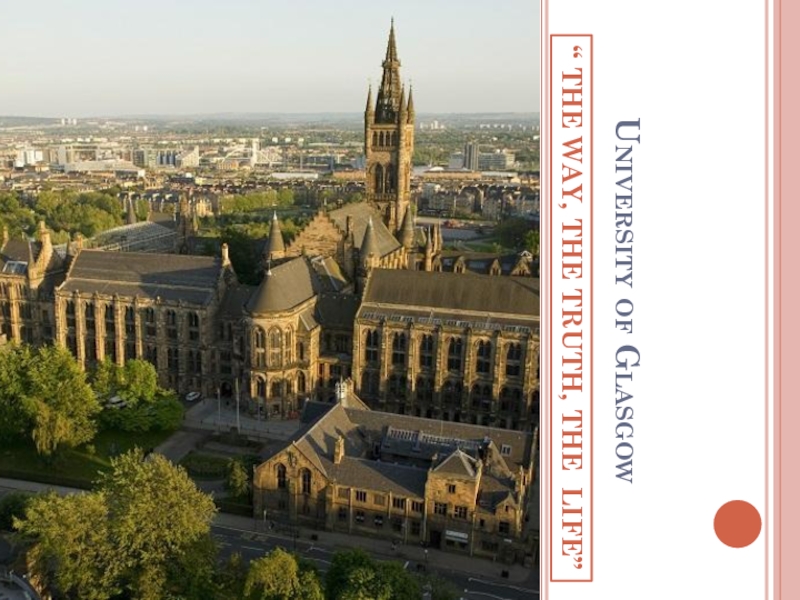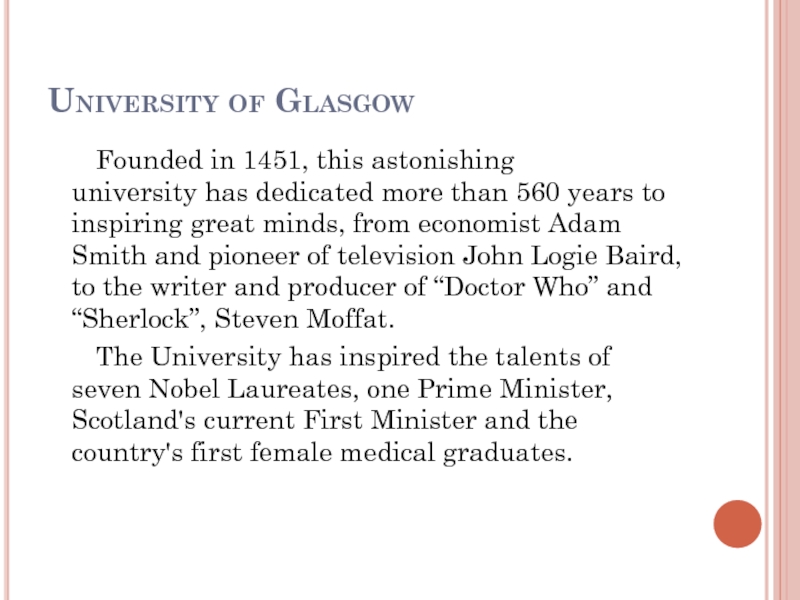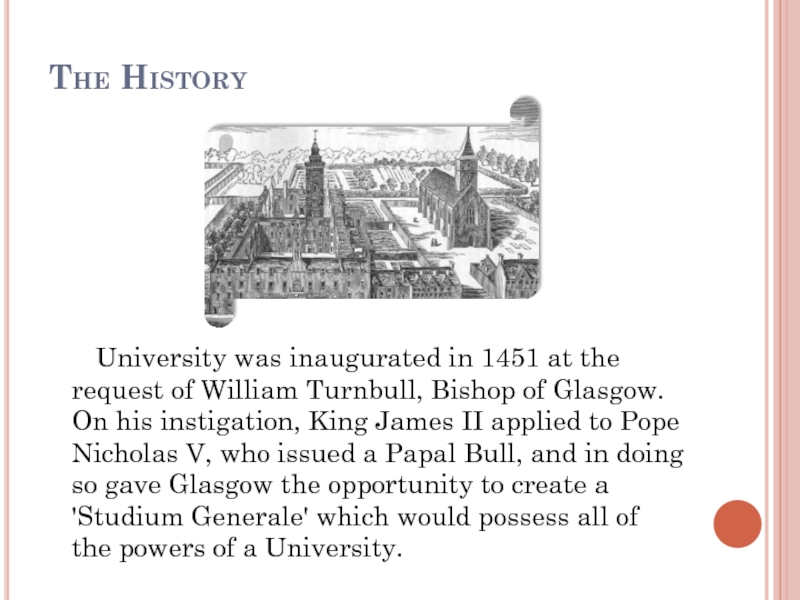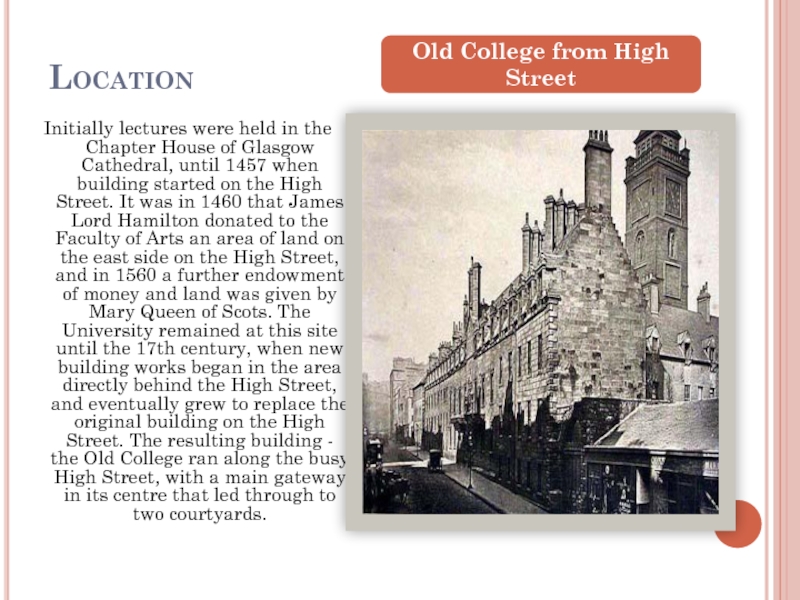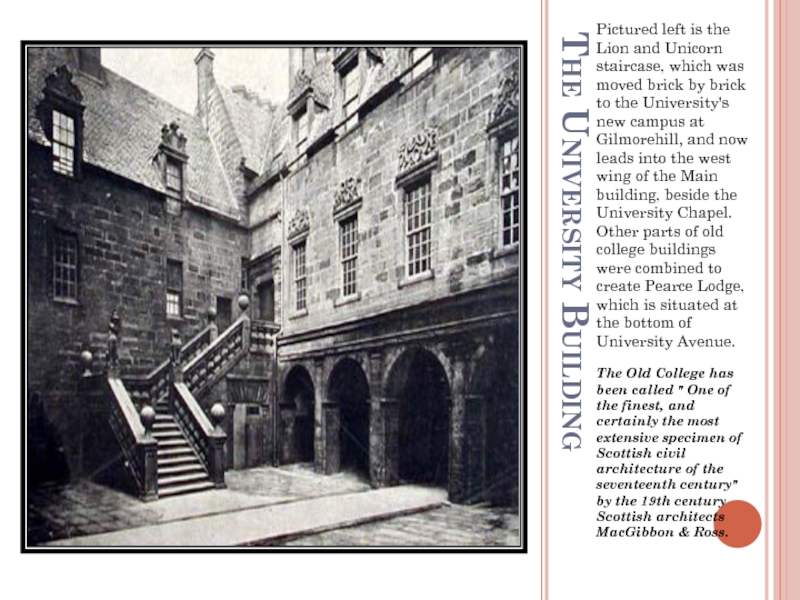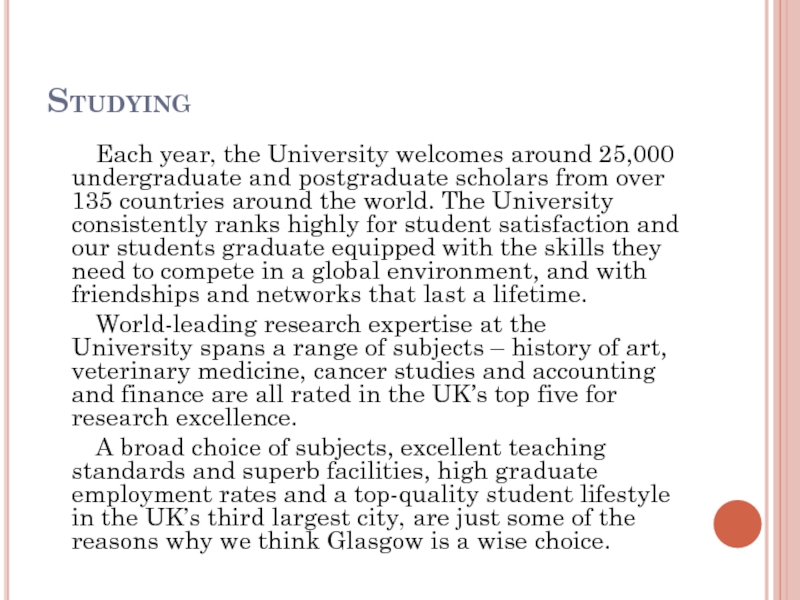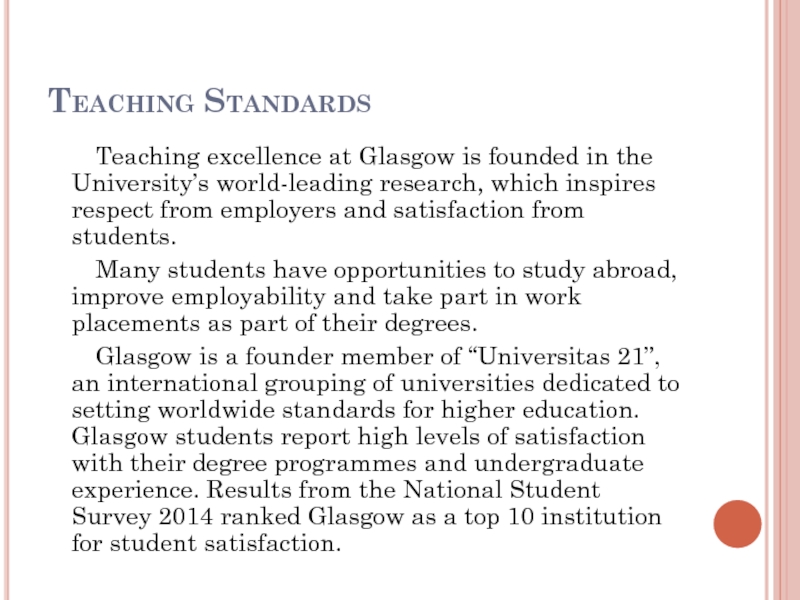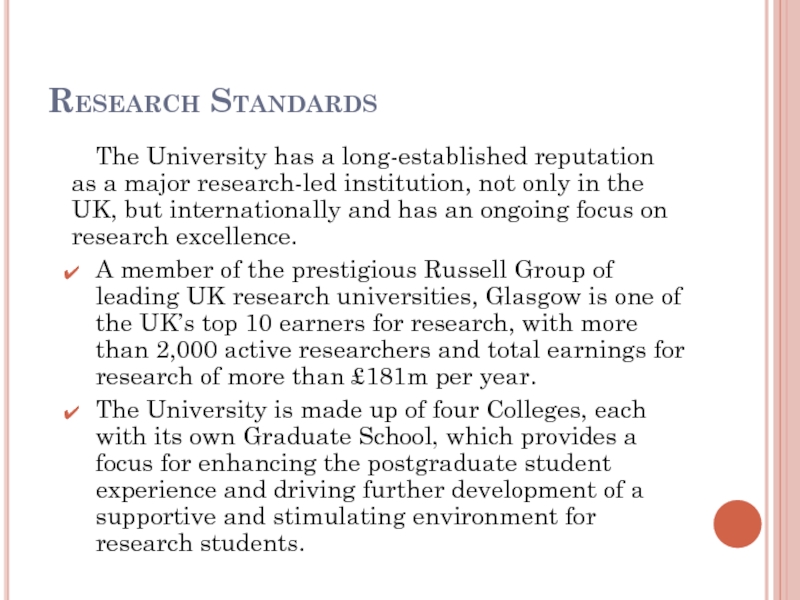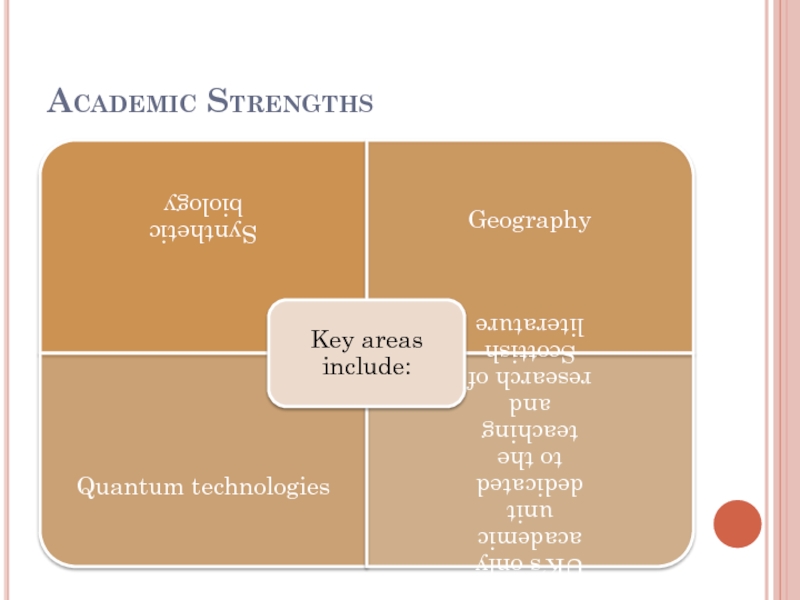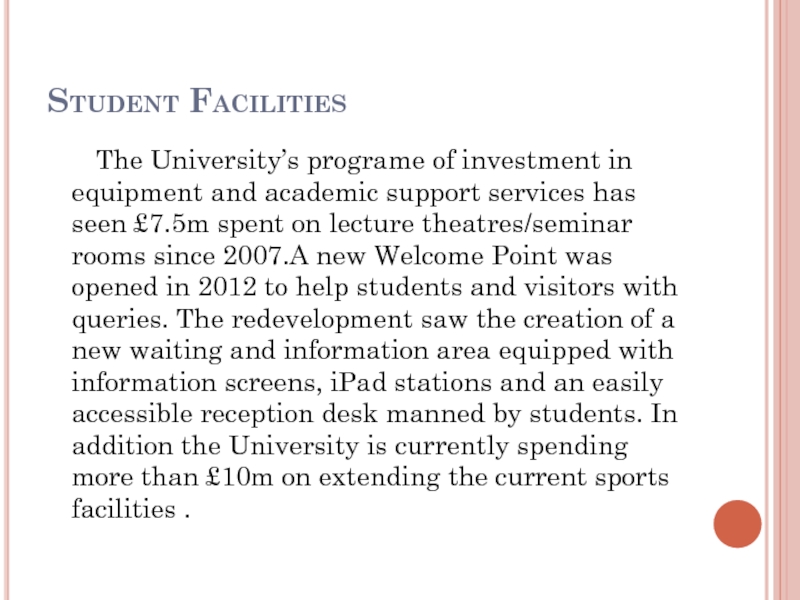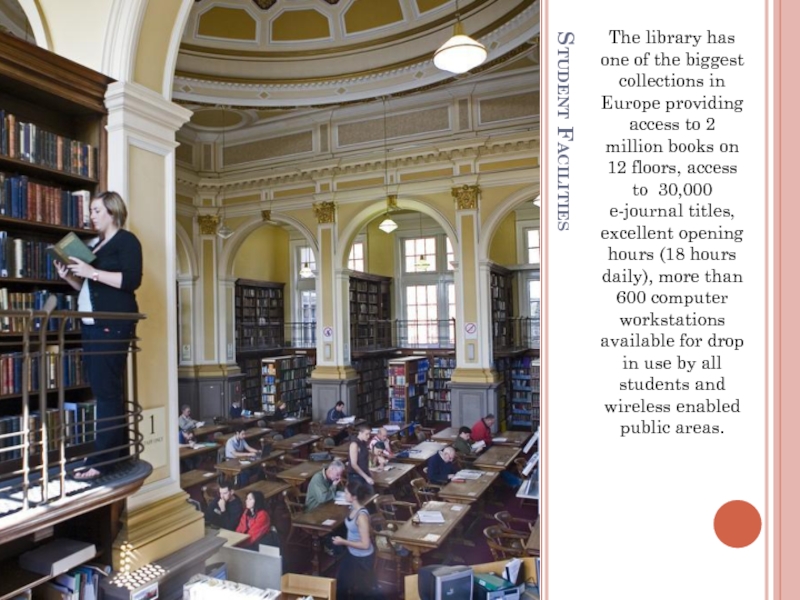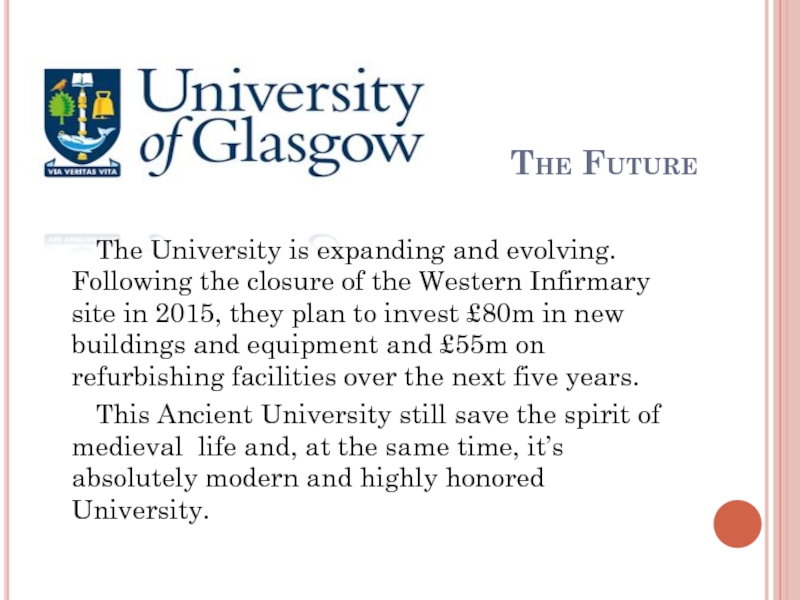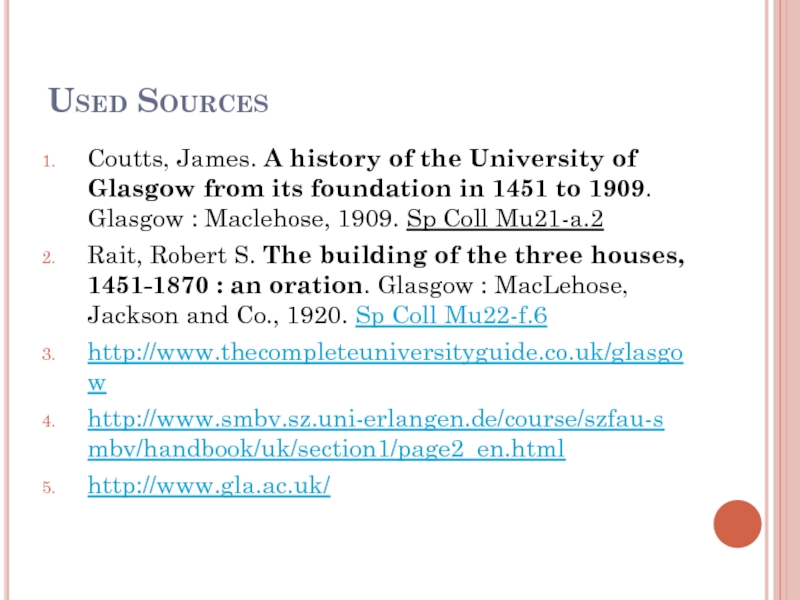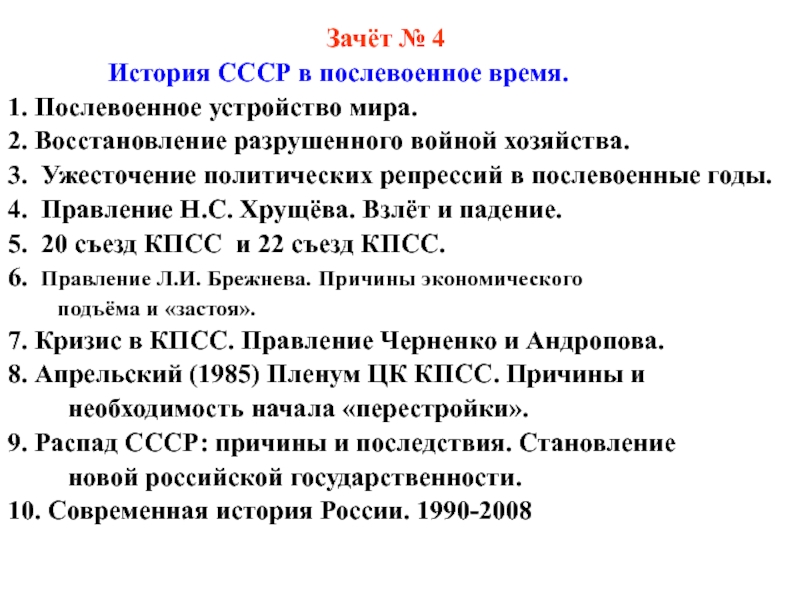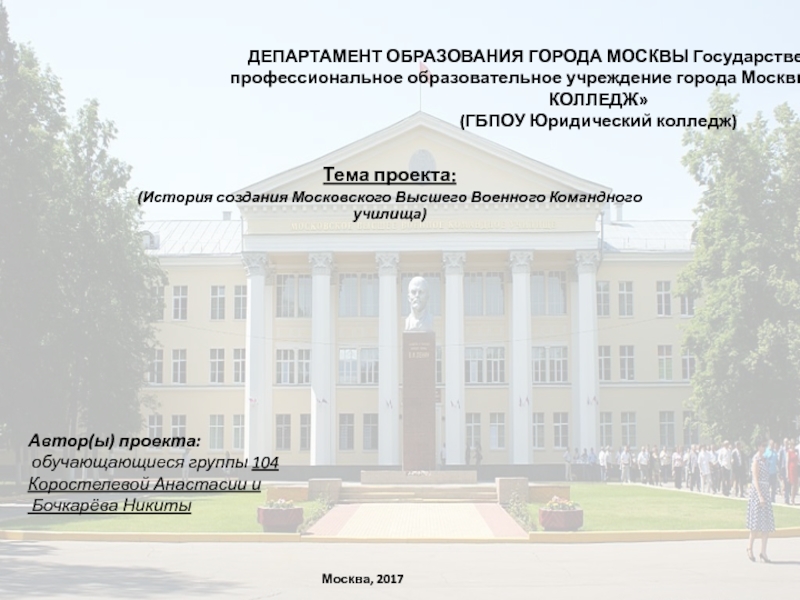31 EU group
- Главная
- Разное
- Дизайн
- Бизнес и предпринимательство
- Аналитика
- Образование
- Развлечения
- Красота и здоровье
- Финансы
- Государство
- Путешествия
- Спорт
- Недвижимость
- Армия
- Графика
- Культурология
- Еда и кулинария
- Лингвистика
- Английский язык
- Астрономия
- Алгебра
- Биология
- География
- Детские презентации
- Информатика
- История
- Литература
- Маркетинг
- Математика
- Медицина
- Менеджмент
- Музыка
- МХК
- Немецкий язык
- ОБЖ
- Обществознание
- Окружающий мир
- Педагогика
- Русский язык
- Технология
- Физика
- Философия
- Химия
- Шаблоны, картинки для презентаций
- Экология
- Экономика
- Юриспруденция
Ancient Universities. University of Glasgow презентация
Содержание
- 1. Ancient Universities. University of Glasgow
- 2. Plan Higher education in the UK Types
- 3. Higher education in the UK The
- 4. Types of Universities The expetional feature of
- 5. Categories of Universities
- 6. Ancient Universities It is widely agreed that
- 7. The full list of ancient universities is
- 9. University of Glasgow “ THE WAY, THE TRUTH, THE LIFE”
- 10. University of Glasgow Founded in 1451, this
- 11. The History University was inaugurated in 1451
- 12. Location Initially lectures were held in the
- 13. The University Building Pictured left is the
- 14. Studying Each year, the University welcomes around
- 15. Course Flexibility Undergraduate students can choose from
- 16. Teaching Standards Teaching excellence at Glasgow is
- 17. Research Standards The University has a long-established
- 18. Academic Strengths
- 19. Student Facilities The University’s programe of investment
- 20. Student Facilities The library has one of
- 21. The Future The University is expanding
- 22. Used Sources Coutts, James. A history of the
Слайд 2Plan
Higher education in the UK
Types of Universities
Ancient Universities
University of Glasgow:
The History
Location
The
University Building
Studying
Course Flexibility
Teaching Standards
Research Standards
Academic Strenghts
Student Facilities
The Future
Used Sourсes
Studying
Course Flexibility
Teaching Standards
Research Standards
Academic Strenghts
Student Facilities
The Future
Used Sourсes
Слайд 3Higher education in the UK
The United Kingdom of Great Britain is
well known by its educational system. Particularly, the vision of higher education in the UK engaged in many students from all over the world. The high quality of knowledge, a vide range of courses, flexible schedules and professional teaching – all these make British universities and colleges so valuable.
Слайд 4Types of Universities
The expetional feature of higher education in UK –
it’s ranging universities to certain types. Although universities come in many shapes and sizes they generally fit into categories, which reflect the educational needs of period in which they were formed.
Traditionally, all universities in Great Britain could be alloted to seven categories.
Traditionally, all universities in Great Britain could be alloted to seven categories.
Слайд 6Ancient Universities
It is widely agreed that higher education in the British
Isles dates back to 1096 at Oxford, the first of the so-called seven ‘ancient universities’ located in the UK and Ireland.
Ancient universities in the United Kingdom and Ireland were founded during the Middle Ages and the Renaissance. Since no universities were founded in the United Kingdom and Ireland between the 16th and 19th century, the term "ancient university" generally refers to institutions of higher education that were established before the 19th century.
Ancient universities in the United Kingdom and Ireland were founded during the Middle Ages and the Renaissance. Since no universities were founded in the United Kingdom and Ireland between the 16th and 19th century, the term "ancient university" generally refers to institutions of higher education that were established before the 19th century.
Слайд 10University of Glasgow
Founded in 1451, this astonishing university has dedicated more than
560 years to inspiring great minds, from economist Adam Smith and pioneer of television John Logie Baird, to the writer and producer of “Doctor Who” and “Sherlock”, Steven Moffat.
The University has inspired the talents of seven Nobel Laureates, one Prime Minister, Scotland's current First Minister and the country's first female medical graduates.
The University has inspired the talents of seven Nobel Laureates, one Prime Minister, Scotland's current First Minister and the country's first female medical graduates.
Слайд 11The History
University was inaugurated in 1451 at the request of William
Turnbull, Bishop of Glasgow. On his instigation, King James II applied to Pope Nicholas V, who issued a Papal Bull, and in doing so gave Glasgow the opportunity to create a 'Studium Generale' which would possess all of the powers of a University.
Слайд 12Location
Initially lectures were held in the Chapter House of Glasgow Cathedral,
until 1457 when building started on the High Street. It was in 1460 that James Lord Hamilton donated to the Faculty of Arts an area of land on the east side on the High Street, and in 1560 a further endowment of money and land was given by Mary Queen of Scots. The University remained at this site until the 17th century, when new building works began in the area directly behind the High Street, and eventually grew to replace the original building on the High Street. The resulting building - the Old College ran along the busy High Street, with a main gateway in its centre that led through to two courtyards.
Old College from High Street
Слайд 13The University Building
Pictured left is the Lion and Unicorn staircase, which
was moved brick by brick to the University's new campus at Gilmorehill, and now leads into the west wing of the Main building, beside the University Chapel. Other parts of old college buildings were combined to create Pearce Lodge, which is situated at the bottom of University Avenue.
The Old College has been called " One of the finest, and certainly the most extensive specimen of Scottish civil architecture of the seventeenth century" by the 19th century Scottish architects MacGibbon & Ross.
The Old College has been called " One of the finest, and certainly the most extensive specimen of Scottish civil architecture of the seventeenth century" by the 19th century Scottish architects MacGibbon & Ross.
Слайд 14Studying
Each year, the University welcomes around 25,000 undergraduate and postgraduate scholars
from over 135 countries around the world. The University consistently ranks highly for student satisfaction and our students graduate equipped with the skills they need to compete in a global environment, and with friendships and networks that last a lifetime.
World-leading research expertise at the University spans a range of subjects – history of art, veterinary medicine, cancer studies and accounting and finance are all rated in the UK’s top five for research excellence.
A broad choice of subjects, excellent teaching standards and superb facilities, high graduate employment rates and a top-quality student lifestyle in the UK’s third largest city, are just some of the reasons why we think Glasgow is a wise choice.
World-leading research expertise at the University spans a range of subjects – history of art, veterinary medicine, cancer studies and accounting and finance are all rated in the UK’s top five for research excellence.
A broad choice of subjects, excellent teaching standards and superb facilities, high graduate employment rates and a top-quality student lifestyle in the UK’s third largest city, are just some of the reasons why we think Glasgow is a wise choice.
Слайд 15Course Flexibility
Undergraduate students can choose from more than 600 degree combinations.
The
university's flexible degree system means that students don't have to restrict their choice of subjects when they begin studying.
As long as students are not studying for a professional degree, it is possible to wait until the end of second year before choosing honorable subject(s), allowing time to try out up to four subjects at university level.
As long as students are not studying for a professional degree, it is possible to wait until the end of second year before choosing honorable subject(s), allowing time to try out up to four subjects at university level.
Слайд 16Teaching Standards
Teaching excellence at Glasgow is founded in the University’s world-leading
research, which inspires respect from employers and satisfaction from students.
Many students have opportunities to study abroad, improve employability and take part in work placements as part of their degrees.
Glasgow is a founder member of “Universitas 21”, an international grouping of universities dedicated to setting worldwide standards for higher education. Glasgow students report high levels of satisfaction with their degree programmes and undergraduate experience. Results from the National Student Survey 2014 ranked Glasgow as a top 10 institution for student satisfaction.
Many students have opportunities to study abroad, improve employability and take part in work placements as part of their degrees.
Glasgow is a founder member of “Universitas 21”, an international grouping of universities dedicated to setting worldwide standards for higher education. Glasgow students report high levels of satisfaction with their degree programmes and undergraduate experience. Results from the National Student Survey 2014 ranked Glasgow as a top 10 institution for student satisfaction.
Слайд 17Research Standards
The University has a long-established reputation as a major research-led
institution, not only in the UK, but internationally and has an ongoing focus on research excellence.
A member of the prestigious Russell Group of leading UK research universities, Glasgow is one of the UK’s top 10 earners for research, with more than 2,000 active researchers and total earnings for research of more than £181m per year.
The University is made up of four Colleges, each with its own Graduate School, which provides a focus for enhancing the postgraduate student experience and driving further development of a supportive and stimulating environment for research students.
A member of the prestigious Russell Group of leading UK research universities, Glasgow is one of the UK’s top 10 earners for research, with more than 2,000 active researchers and total earnings for research of more than £181m per year.
The University is made up of four Colleges, each with its own Graduate School, which provides a focus for enhancing the postgraduate student experience and driving further development of a supportive and stimulating environment for research students.
Слайд 19Student Facilities
The University’s programe of investment in equipment and academic support
services has seen £7.5m spent on lecture theatres/seminar rooms since 2007.A new Welcome Point was opened in 2012 to help students and visitors with queries. The redevelopment saw the creation of a new waiting and information area equipped with information screens, iPad stations and an easily accessible reception desk manned by students. In addition the University is currently spending more than £10m on extending the current sports facilities .
Слайд 20Student Facilities
The library has one of the biggest collections in Europe
providing access to 2 million books on 12 floors, access to 30,000 e-journal titles, excellent opening hours (18 hours daily), more than 600 computer workstations available for drop in use by all students and wireless enabled public areas.
Слайд 21The Future
The University is expanding and evolving. Following the closure
of the Western Infirmary site in 2015, they plan to invest £80m in new buildings and equipment and £55m on refurbishing facilities over the next five years.
This Ancient University still save the spirit of medieval life and, at the same time, it’s absolutely modern and highly honored University.
This Ancient University still save the spirit of medieval life and, at the same time, it’s absolutely modern and highly honored University.
Слайд 22Used Sources
Coutts, James. A history of the University of Glasgow from its
foundation in 1451 to 1909. Glasgow : Maclehose, 1909. Sp Coll Mu21-a.2
Rait, Robert S. The building of the three houses, 1451-1870 : an oration. Glasgow : MacLehose, Jackson and Co., 1920. Sp Coll Mu22-f.6
http://www.thecompleteuniversityguide.co.uk/glasgow
http://www.smbv.sz.uni-erlangen.de/course/szfau-smbv/handbook/uk/section1/page2_en.html
http://www.gla.ac.uk/
Rait, Robert S. The building of the three houses, 1451-1870 : an oration. Glasgow : MacLehose, Jackson and Co., 1920. Sp Coll Mu22-f.6
http://www.thecompleteuniversityguide.co.uk/glasgow
http://www.smbv.sz.uni-erlangen.de/course/szfau-smbv/handbook/uk/section1/page2_en.html
http://www.gla.ac.uk/
